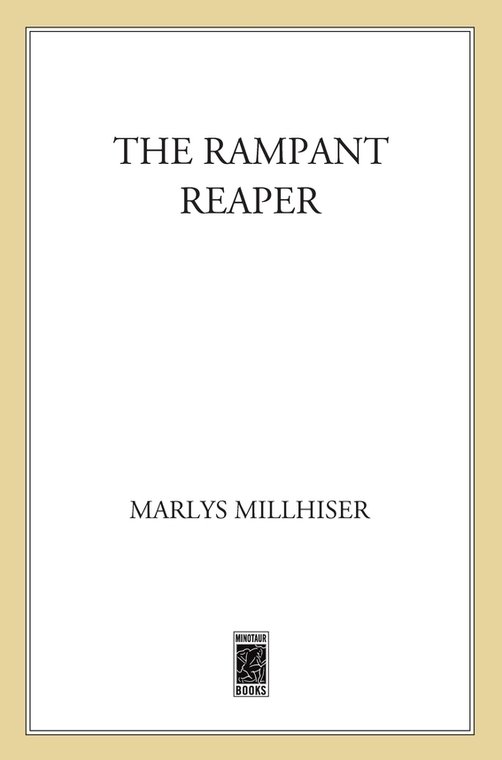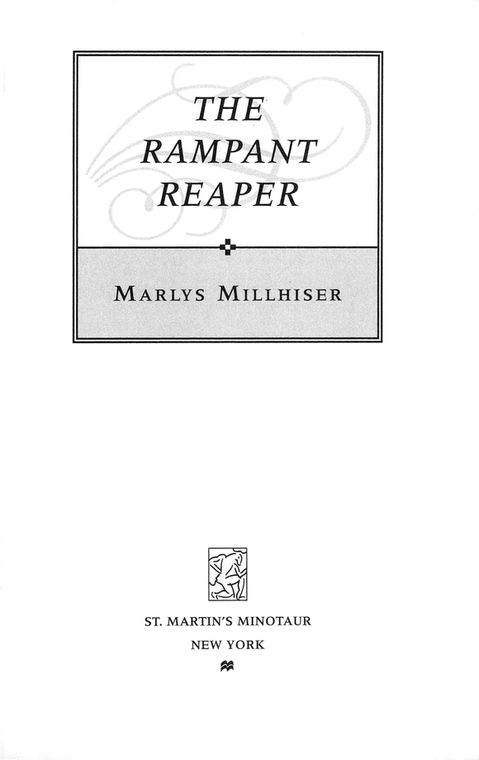The Rampant Reaper
Read The Rampant Reaper Online
Authors: Marlys Millhiser



Table of Contents
Title Page
CHAPTER
1
CHAPTER
2
CHAPTER
3
CHAPTER
4
CHAPTER
5
CHAPTER
6
CHAPTER
7
CHAPTER
8
CHAPTER
9
CHAPTER
10
CHAPTER
11
CHAPTER
12
CHAPTER
13
CHAPTER
14
CHAPTER
15
CHAPTER
16
CHAPTER
17
CHAPTER
18
CHAPTER
19
CHAPTER
20
CHAPTER
21
CHAPTER
22
CHAPTER
23
CHAPTER
24
CHAPTER
25
CHAPTER
26
CHAPTER
27
CHAPTER
28
CHAPTER
29
CHAPTER
30
CHAPTER
31
CHAPTER
32
CHAPTER
33
CHAPTER 34
CHAPTER
35
CHAPTER
36
CHAPTER
37
CHAPTER
38
CHAPTER
39
CHAPTER
40
CHAPTER
41
CHAPTER
42
ALSO BY MARLYS MILLHISER
Copyright Page
CHAPTER
1
CHAPTER
2
CHAPTER
3
CHAPTER
4
CHAPTER
5
CHAPTER
6
CHAPTER
7
CHAPTER
8
CHAPTER
9
CHAPTER
10
CHAPTER
11
CHAPTER
12
CHAPTER
13
CHAPTER
14
CHAPTER
15
CHAPTER
16
CHAPTER
17
CHAPTER
18
CHAPTER
19
CHAPTER
20
CHAPTER
21
CHAPTER
22
CHAPTER
23
CHAPTER
24
CHAPTER
25
CHAPTER
26
CHAPTER
27
CHAPTER
28
CHAPTER
29
CHAPTER
30
CHAPTER
31
CHAPTER
32
CHAPTER
33
CHAPTER 34
CHAPTER
35
CHAPTER
36
CHAPTER
37
CHAPTER
38
CHAPTER
39
CHAPTER
40
CHAPTER
41
CHAPTER
42
ALSO BY MARLYS MILLHISER
Copyright Page
For aging children of the elderly everywhere
M
ONSTER TREES STRETCHED a shroud across the sunlight and Charlie Greene in the sad little graveyard. Spores of dying leaves and turned earth moved thick on the air. The earth was so black she imagined it seethed with impatience to decay or to grow anything that came near. A hungry, spongy earth that sucked at her boot heels.
ONSTER TREES STRETCHED a shroud across the sunlight and Charlie Greene in the sad little graveyard. Spores of dying leaves and turned earth moved thick on the air. The earth was so black she imagined it seethed with impatience to decay or to grow anything that came near. A hungry, spongy earth that sucked at her boot heels.
In clear sunlight on the other side of a wire fence, giant harvesting machines and grain trucks longer than railroad cars rumbled and exhaled gassy breath to provide sustenance for the living. Charlemagne Catherine Greene stood at her mother's side to provide solace for the dead? Why
was
she here?
was
she here?
Still dressed in their airplane clothes, they looked as out of place as belly dancers at a church supper.
Moss in burnt-orange splotches, like a creeping rust, nearly covered the bases of gray gravestones. No little flat-to-the-ground bronze identifiers here that you could run a riding mower over, nor much grass to mow, what with all the shade.
There were obelisks tall and short, pointed stretched-out pagodalike things, slabs rounded at the top, large and small. And the small white lambs, heartbreaking in number, denoting the young and the very young and the stillborn. This might be a small cemetery, but it was a crowded one.
Charlie, in tight black jeans, short black-leather jacket over a silk cranberry blouse, and black boots with high, square heels, figured she looked, here, like the type to jump on the back of some ancient, bald, bearded hippy's motorcycle.
Funny, in L.A. she'd felt fairly fashionable in this outfit, more like the type to drive off in a Porsche with a young hunk.
Funny, in L.A. she'd felt fairly fashionable in this outfit, more like the type to drive off in a Porsche with a young hunk.
Edwina Greene's tailored black suit screamed expensive. The whole effect spoiled by sensible shoes. At least she wasn't sinking into the soil.
The gloom was not lightened by the number of mourners in wheelchairs hacking up God-knew-what to drown out the minister bravely trying to minister. Between the hacking oldsters and the graying children behind their wheelchairs, the minister and the marshal were closer to her age than anyone but those innocents long rotted away under the white lambs.
The oldsters demanded to know when could they take their nap, eat, go to the bathroom, or simply get the hell out of hereâwho was it being planted anyway? Their children, Charlie figured, counted the days until they could escape to Arizona for the winter.
She knew who was the marshal because he leaned against a Jeep Cherokee wearing a George W. grin to perfection, and on the side of the blood-red vehicle supporting him and his grin, MYRTLE MARSHALL stood out dramatically in white.
The minister, obvious because she officiated, wore a long, flowing skirt and a knowing if benign cast as she picked up a handful of that hungry black dirt. She said something Charlie couldn't hear over the honking, snorting, hacking of the geezers in wheelchairs, the pointed questions of the hearing-impaired of both sexes, and the harvesting machinery roaring on the other side of the fence.
Dead leaves swooped and swayed in a gentle, gliding fall to touch down and crunch brittle underfoot as the uneasy and demented alike shifted in their discomfort.
Everything but the leaves seemed to go silent, every eye that could see turned to Charlie Greene, and even the good-natured marshal stopped grinning when a mewling sounded in Charlie's purse.
If you want to know what it's like to feel truly out of place, forget to turn off your cellular at a funeral.
Charlie's mother walked stone-cold silent to the rental car parked along the road outside the Myrtle Cemetery. Two handicap vans passed them loaded with the wheelchair folks. Some of their gray-haired children looked over their shoulders at the Greenes. They were about Edwina's age, the women were dressed in a combination of skirt lengths and sensible shoes, some in dressy pants. Their husbands in white or light shirts, no ties or coats. The day was warm once you left the gravestones.
Charlie looked back to see the Myrtle marshal filling in Great-aunt Gertie's grave. Charlie walked in sunlight, he shoveled in deep shade. Stephen King'd have a blast with this.
“God, I'm sorry about the cellâit just seems like I've been rushing around all day and haven't caught up with my head yet. I didn't mean to embarrass you, honest.”
Charlie's mother turned with tears in her eyes. “Don't sweat that, Charlie. For once, this isn't about us.”
What isn't about us? I fly from Long Beach to LAX to Minneapolis and take the vomit comet to some place called Mason City and we rent a car for another place called Myrtle where
your
great-aunt died. I'm adopted. I'm not related to her. Do you have any idea of what I'm missing back home and at work? How important can this be?
your
great-aunt died. I'm adopted. I'm not related to her. Do you have any idea of what I'm missing back home and at work? How important can this be?
But Charlie couldn't remember seeing her mother in tears since Charlie's father, Howard, died, and she was too stunned to voice her angst. And stunned by Myrtle, Iowa, too. The marshal had taken off his lumberjack shirt.
Charlie worked in Beverly Hills on Wilshire at the firm of Congdon and Morse Representation, Inc., a Hollywood talent agency, as their sole literary agent, and that call had come from a new, exciting, and valued client. It was one of the many reasons she should not be in Myrtle. Charlie had sucked up her heels from the ravenous dirt to crawl off behind a really big flat, bending-over slab tombstone to answer the call. She
hadn't been this humiliated since she realized nobody was going to ask a pregnant teen to the prom. She'd had to make whispered excuses to Shirley Birkett, the latest successor to Danielle Steel, and would have to find time real soon to answer that call more fully.
hadn't been this humiliated since she realized nobody was going to ask a pregnant teen to the prom. She'd had to make whispered excuses to Shirley Birkett, the latest successor to Danielle Steel, and would have to find time real soon to answer that call more fully.
Jesus, we're talking bucks here, careers even.
But somehow, looking at the people of Myrtle, she didn't think she'd bring all that up over coffee. And there was coffee, with three different kinds of carrot cake, in the basement at the tiny Methodist Church. Here, people even came up to talk with Edwina, who still looked shockingly exotic. Imagine how her daughter looked.
“Edwina, what's happened to you? You were always so lankâI mean ⦠studious. Did you finally find God?”
“Cancer finally found me,” Charlie's mother answered politely. She certainly had changed since her mastectomy. Even Charlie couldn't believe how much. “Aunt Abigail, I'd like you to meet my daughter, Charlemagne Catherine Greene.”
Aunt Abigailâhow many aunts were there around here?âlooked Charlie up and down and sideways over half-glasses. She was taller than both Charlie and Edwina, arrow-straight and bone-thin. Her navy-blue dress had a startling-white lace collar. Her cheeks had sags where once had been bags.
“So, it's you, is it?” Aunt Abigail had to be ancient, but her movements were as swift and sure as her dislike when she turned away and strode to the other side of the room.
“God, Mom, I didn't know how to dressâthis was all so quick. And all you said was the weather was changeable in Iowa in October.”
“It's not you, honey. It's her. Remember that. Sorry I had to bring you and on such short notice. But there are things you need to know. Now, let's both stop being sorry. It can get you suffocated here.”
Charlie's mom hadn't called her “honey” since she gave birth at sixteen. Edwina, a professor of biology, lived in Boulder.
Charlie lived in Long Beach as the unwed mother of a trying, gorgeous teenage daughter, Libby.
Charlie lived in Long Beach as the unwed mother of a trying, gorgeous teenage daughter, Libby.
“Oh, Edwina, I'm sorry about Aunt Abigail. But I guess we both know what we're facing here.” This was Cousin Helen, who had stood off away from them at the burial of Aunt Gertie but who now hugged Edwina, and Charlie, too. She smelled pleasantly of black soil and garlic. “I know this has got to be culture shock coming in from the real world, but I am so grateful. I haven't told her anything. I was waiting for you guys to help me out.”
The basement was chilly. Charlie's leather jacket didn't seem enough. She took one bite of carrot cake and put its paper plate with the plastic fork on a table. She hugged a paper cup of hot, watered-down coffee for solace. Others seemed to draw courage from Cousin Helen and approached Charlie's mom, most remaining distant from but curious about Edwina's daughter.
They tended to be short, middle-aged to senior citizen types, their elders deposited someplace by the handicap van. The men had white foreheads where the sun had not reached under baseball caps. The women looked sort of like laid-back soccer grandmoms, if there were such things.
But before they could really warm up to the exotic Greenes, Great-aunt Abigail announced soundly and surely from across the room, “Gertrude died old and sick and cursed. And we all know why.” The glaring-white collar rose as the old lady's arm lifted, and, a finger pointing at the guests, she whirled to face the interlopers and glared directly at Charley. “Because of her. It was murder.”
Other books
Beauty's Release by Anne Rice
Family (Insanity Book 7) by Cameron Jace
Mountain of the Dead by Keith McCloskey
The Good Book by Grayling, A. C.
Porch Lights by Dorothea Benton Frank
The Line of Polity by Neal Asher
15 Years Later: Wasteland by Nick S. Thomas
Love & Loss by C. J. Fallowfield
Unhallowed Ground by Mel Starr
The Autumn Dead by Edward Gorman
